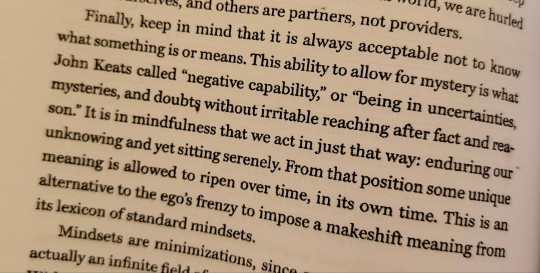#david richo
Explore tagged Tumblr posts
Text
[“Love or any deep connection with another person, however brief, does more than just satisfy us in the present. It ripples back in time, repairing, restoring, and renovating an inadequate past. Sincere love also sets off a forward-moving ripple and a resultant shift inside us. We get to the point where we can think: “Now I don’t have to need quite so much. Now I don’t have to blame my parents quite so much. Now I can receive love without craving more and more. I can have and be enough.” The person whose journey has progressed to that point is ready to love someone intimately.”]
david richo, from how to be an adult in relationships: the five keys to mindful loving, 2002
3K notes
·
View notes
Text
“Our heart is the soft center of the egoless self and it has one desire: to open. The heart is the capacity to open.… It contains our ability to reach out so it is the antidote to despair.… Contemplation of Jesus’ Heart shows us how deep we really are, how vast our potential for love, how high our aspiration for the light.” –David Richo
12 notes
·
View notes
Text
just rereading a book about coming to terms with being raised by emotionally insecure parents, for no reason
3 notes
·
View notes
Text
“Disappointment is a kind of loss: the loss of what we had hoped something was, or could be. At bottom is the loss of an illusion to which we cling or on which we relied — but the only thing that can be lost, after all, is illusion.”
- David Richo
I need a cigarette after reading this lmao
4 notes
·
View notes
Text

David Richo, How to Be an Adult in Relationships
“To know the night is a lot like knowing poetry, and knowing poetry requires what Keats called “negative capability,” the capacity for “being in uncertainties, mysteries, doubts, without any irritable reaching after fact and reason.” To know the night means having the clarity that some things are and should be and always will be hidden, for the night has been, or is, or should always be, the time of lovers, revolutionaries, and other conspirators. The night world is that which should be, or once always was, veiled.”
— Anne Boyer, from her essay “The Fall of Night”, Lapham’s Quarterly, Volume XII, Number 1 | Winter 2019 (via kitchen-light)
2K notes
·
View notes
Text
Be gentle with yourself. You are a child of the universe no less than the trees and the stars; you have a right to be here. Whether or not it is clear to you, no doubt the universe is unfolding as it should... With all its sham, drudgery, and broken dreams, it is still a beautiful world.
- Max Ehrmann - quoted in When the Past Is Present, David Richo
#books books books#ich#psychology#psychblr#reading#therapy#max ehrmann#when the past is present#david richo#cptsd healing#ptsd healing#calm calm calm
0 notes
Text
i drop every pretense and pose, and let my every word and action reveal who I truly am
0 notes
Text
Our wounds are often the openings into the best and most beautiful part of us.
David Richo
252 notes
·
View notes
Text
If I had stupid richo fuck off money I WOULD be hiring David Tennant and Catherine Tate as we speak. And I WOULD be making them play the king's loyal advisor and a charming but dastardly rogue who secretly working to assassinate the king in legion with the queen. And they WILL both question their allegiances because they're slowly becoming devoted to each other.
#i just want to see them in everything together#and more importantly see them hold a blade to each others throat#because i am a simple bi
89 notes
·
View notes
Text




















on unconditional and long-lasting love
Friedrich Nietzsche /// Paramore - Still Into You /// @ dimpledthings /// @ 8bitstories /// The Score - I Believe /// @ mice-teeth /// Conrad Sewell - Hold Me Up /// Casey McQuiston - One Last Stop /// Sleeping At Last - Heart /// Dagou - Burning Tears /// David Richo - How to Be an Adult in Love /// Stanfour - I Will Be /// ? /// Death Cab For Cutie - Soul Meets Body /// ? /// @ ruhlare /// David Guterson - Snow Falling On Cedars /// Lord Huron - The Man Who Lives Forever /// Otherside Picnic /// @ veryluckyclovers
19 notes
·
View notes
Text
Befriending the shadow is really about learning to love
We let the dark out to let love in
- David Richo
#shadow work#self love#inner light#shadow work quotes#shadow self#philosophy quotes#jungian shadow#jungian psychology#philosophy#psychology quotes#healing journey#spiritual healing#spiritual wisdom#spiritual quotes#spiritual growth#spiritual awakening#heart chakra#carl jung#witchblr#lightworker
17 notes
·
View notes
Text
[“When our demands for love become compulsive or insatiable, we have a clue that we doubt our own lovability. For when we doubt that we are lovable, we often need to see it proved over and over. This seems narcissistic on our part, but viewed from a more compassionate perspective, it may suggest that we have a low opinion of ourselves. Indeed, the need to be seen as special can be a compensation for feeling unloved. How can we overcome our self-doubt? Through a simple practice: act lovingly. Lovability is actually the other side of the coin of loving. People who believe they are lovable are people who love. People who love are more likely to be loved. This involves letting go of ego, but it also requires a unique frame of mind: When any conflict or issue arises between ourselves and someone else, we ask not how to win but how to summon up a loving intent and how to act on it. Our immediate question is “How can I be as loving as possible in this circumstance?”]
david richo, from how to be an adult in relationships: the five keys to mindful loving, 2002
216 notes
·
View notes
Text
Our wounds are often the openings into the best and most beautiful part of us.
-David Richo
#quotes#inspiring quotes#quoteoftheday#inspiration#motivation#words#writing#growing up#original poem#sadgirl
10 notes
·
View notes
Text

“Our wounds
are often
the openings into
the best and most
beautiful part of us.”
- David Richo
12 notes
·
View notes
Text
"Success is in the sincerity of our intention, not in getting it right every time. So even if we often fail to live up to our goals, as long as we keep returning to our efforts, we are living enlightened lives." David Richo
9 notes
·
View notes
Text

Books that helped me on my spiritual journey and shadow work:
Shadow Dance by David Richo
The Body Keeps the Score by Bessel Van Der Kolk
Big Magic by Elizabeth Gilbert
How Your Unconscious Mind Rules Your Behavior by Leonard Mlodinow
all about love by bell hooks
No Mud No Lotus by Thich Nhat Hanh
The Undiscovered Self by Carl Jung
First time reading these was about gaining information and widening my perspectives outside things I already knew. For example, I already knew we're mostly driven by our subconscious, but how? The second time(s) around, it was mostly about finding solace and ease in my current situation and understanding how I could apply my knowledge to real life.
4 notes
·
View notes